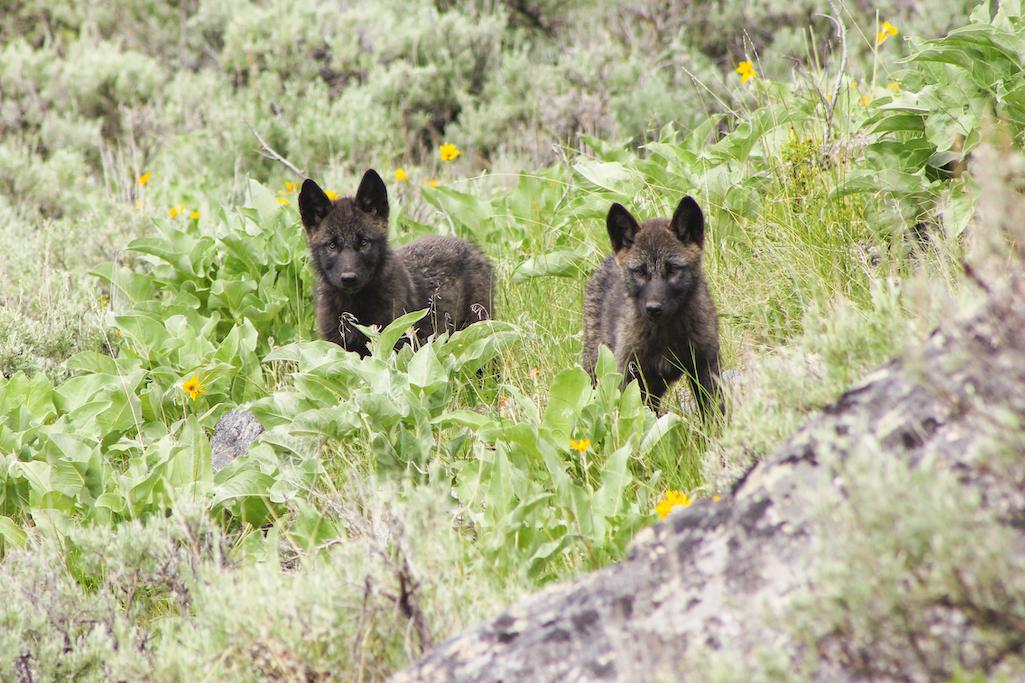
Junction Butte pups (not the pups recently killed) photographed by wolf program park staff using a telephoto lens. NPS / Jeremy SunderRaj 2019
Three wolves that ranged north out of Yellowstone National Park were killed during the first week of Montana's wolf hunting season, according to park staff.
The slain wolves were members of the Junction Butte Pack that ranges across Yellowstone's northern range and "is the most viewed wolf pack in the world," a park release said Monday.
Multiple recent overflights conducted by the park confirmed the pack size has been reduced from 27 to 24 animals, losing two female pups and one female yearling, the release added, also noting that Montana Fish, Wildlife & Parks confirms three wolves were killed outside of Yellowstone in the general vicinity of where the Junction Butte Pack was traveling in mid-September.
Yellowstone wolves in the northern range spend an estimated 5 percent of the time outside the park, usually in late fall, according to park wildlife biologists. For more than a decade, the state of Montana limited the number of wolves taken from Montana wolf management units 313 (Gardiner) and 316 (Cooke City), which are immediately adjacent to the park’s northern boundary.
Ninety-eight percent of wolves in Montana are outside units 313 and 316. Recent state changes to hunting and trapping have lifted restrictions within these units, making Yellowstone’s wolf population in the northern range extremely vulnerable, the park noted. Montana has also authorized baiting from private property. Over 33 percent of the boundary Yellowstone shares with Montana is within one mile of private property where baiting is now permissible.
“Yellowstone plays a vital role in Montana’s wildlife conservation efforts and its economy. These wolves are part of our balanced ecosystem here and represent one of the special parts of the park that draw visitors from around the globe,” said Yellowstone Superintendent Cam Sholly. “We will continue to work with the state of Montana to make the case for reinstating quotas that would protect the core wolf population in Yellowstone as well as Montana’s direct economic interests derived from the hundreds of millions spent by park visitors each year.”
Visitor spending within communities that are 50 miles from Yellowstone exceeds $500 million per year, tens of millions of which is spent by visitors coming to watch wolves and supporting Montana businesses in gateway communities.
The Junction Butte Pack formed in 2012. They are the most observed pack in Yellowstone because they den within view of the Northeast Entrance Road and the road to Slough Creek Campground, providing thousands of visitor’s daily views. The pack had eight pups in 2021.



Comments
Thank you for telling the truth about what the states of Montana and Idaho are doing to wolves.
There's plenty of wolves. Who cares? People that don't live around wolves? What about the decline in the moose population in areas of the West were wolves are populating?
I care!!!!! As a avid hunter and photographer who just photographed the Junction Butte Pack recently I am appalled at the baiting of wolves and the shooting of pups. That's not hunting nor are those doing it hunters. I realize that the packs need to be controled outside the Park but these tactics are are anything short of acceptable to a real hunter. Montana is a proud state and is above this. And by the way I saw plenty of moose on my trip to Glacier, Yellowstone and the Tetons. I hope the real outdooorsmen and hunters will stand up to these tactics and restore honor to their sport.
Baiting wolves is the more humane way to hunt them because the hunter can prepare the shooting zone.area by the bait to give her the best possible opportunity for a clean humane kill. Unbaited hunting allows for less certainty of a clean humane kill. Steel leg hold traps are another great option for humane killing of wolves. Doesn't the US Fish and Wild Life Service use baits and steel leg hold traps to capture wolves for study?
John Bitely is 100% correct. Hunting is based on a set of ethics. Baiting is unethical and is a means of extirmination.
And I care, as well! Why do humans feel the need to kill animals simply for sport, anyway. This isn't a case of hunting for food-these wolves weren't hurting anything; they are only surviving as wolves have done for centuries. And we have already found how trying to eliminate one species of animal upsets the balance of Nature-look what happened in Yellowstone when the wolves were killed off. Why can't people just live with Nature instead of thinking that we are the superior species and we must control all other species?
Yellowstone did well without wolves.https://www.nytimes.com/2014/03/10/opinion/is-the-wolf-a-real-american-h...